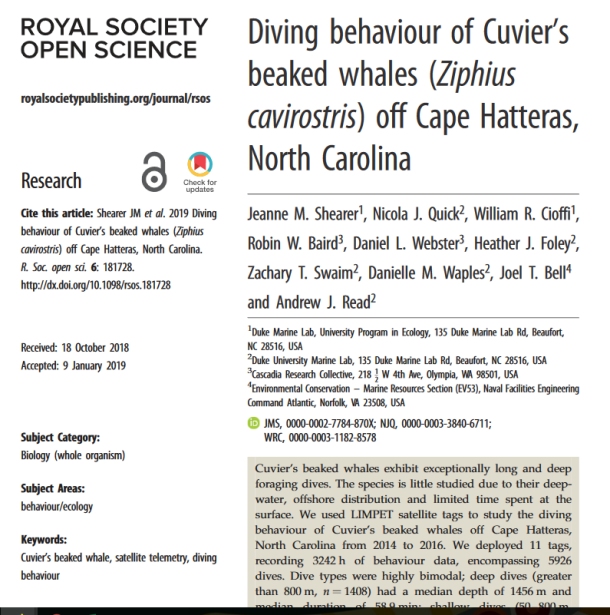New publication on Cuvier's beaked whale diving behavior off Cape Hatteras
Posted on February 6, 2019
A new Duke University-led study funded by U.S. Fleet Forces Command provides the first detailed record of the diving behavior of Cuvier’s beaked whales in U.S. Atlantic waters. Cuvier’s beaked whales are the world’s deepest-diving mammal, but studies of their behavior are constrained by the animals’ offshore location and limited time spent at the surface. The new data, recorded from 5,926 dives of tagged whales off Cape Hatteras, N.C., showcases the remarkable diving abilities of these animals and provides new clues to how they make a living at the extremes of depth and cold. Past studies have documented the diving behavior of Cuvier’s beaked whales in Pacific waters, Italy, and the Bahamas, but this is the first one focused in the U.S. Atlantic. Scientists estimate about 6,500 Cuvier’s beaked whales live in the northwest Atlantic. Populations in different areas exhibit some differences in diving behavior, highlighting the need for data from around the world.
To conduct the study, scientists attached LIMPET satellite-linked tags to 11 Cuvier’s beaked whales that live and dive most of the year in waters a two-hour boat ride from Cape Hatteras. One tag failed, but the other 10 recorded 3,242 hours of behavioral data from 5,926 individual dives -- both deep and shallow -- between 2014 and 2016. Aside from the extremely deep dives that these whales are able to make, the data showed that they dive nearly continually, with deep dives followed by 3-4 shallow dives that extend to around 300 meters. How they continuously dive to these depths without long recovery periods is still a mystery to scientists. The results of this analysis were recently published in the journal Royal Society Open Science.
Aside from adding to our knowledge of the species’ remarkable diving capability, the findings provide a baseline for controlled exposure experiments to study their reactions to tactical military sonar (see Atlantic Behavioral Response Study for more information).
Diving Behaviour of Cuvier’s Beaked Whales (Ziphius cavirostris) Off Cape Hatteras, North Carolina. Jeanne M. Shearer, Nicola J. Quick, William R. Cioffi, Robin W. Baird, Daniel L. Webster, Heather J. Foley, Zachary T. Swaim, Danielle M. Waples, Joel T. Bell and Andrew J. Read. Royal Society Open Science, Feb. 6, 2019. DOI: 10.1098/rsos.181728


